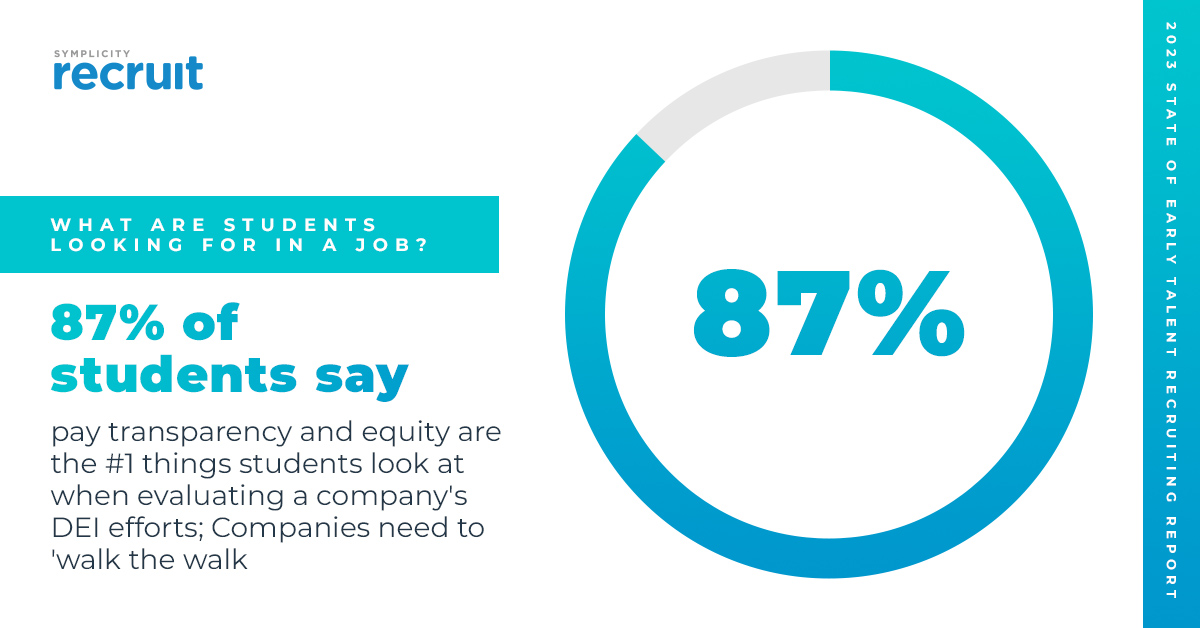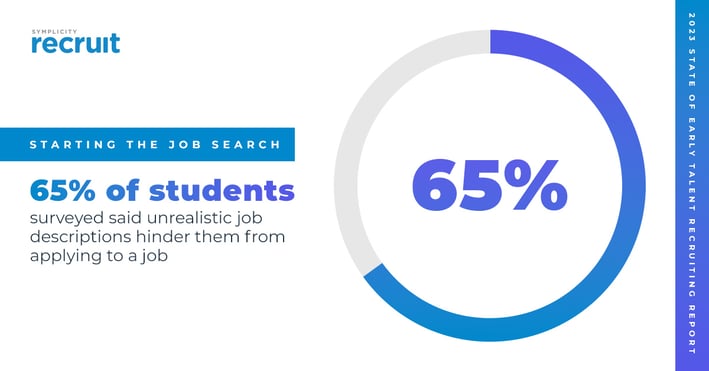At the beginning of March, Symplicity Recruit conducted its second annual student survey to learn more about how Gen Z approaches the job search process as they near their college graduation dates. Through the responses, Symplicity Recruit gained a better understanding of some of the challenges students face throughout the application process and what their advice is for recruiters and career advisors looking to increase engagement.
Here are the top 3 takeaways from our 2023 student survey.
Job Descriptions Are a Big Deal. Make Them Clear and Transparent.
It’s a well-known fact that Gen Z is quick to recognize dishonest messaging and is weary of anything that contains too many buzzwords. Yet, more often than not, in an effort to attract best-fit talent for entry-level positions, employers end up with extended wish lists of qualifications and unclear salary benchmarks. Unfortunately, this tends to dissuade a percentage of applicants from moving forward in the application process, particularly women.
Our survey found that students struggle with feeling confident in their experience and qualifications for entry-level jobs; citing unrealistic expectations and a lack of specifics on the ins and outs of the job as a key concern in their job search. 59% of students were concerned that they did not meet the right qualifications for the jobs they’re applying to, with 65% of students admitting seeing too many unrealistic job requirements discourages them from applying to a job.
For women, this particular sentiment hit close to home, with 63% of women vs. 52% of men having a greater concern about not being able to meet qualifications when searching for jobs after college than men.
What This Means for Employers
To create more effective job descriptions that are inclusive of every applicant, consider removing unnecessary qualifications and investing in skills-based hiring as a way to increase the number of entry-level talent entering your recruiting funnel.
In a Dwindling Economy, Pay Transparency Is Crucial

Students value transparency on all fronts of the job search process, specifically when it comes to their pay. Our student survey found that talking about salary benchmarks throughout the application and job search process greatly increases the chance of applicants following through with their applications. In addition, pay transparency and equity is the DEI effort that students care the most about, particularly among the diverse talent you are hoping to hire in your companies. Gen Z wants to have confidence in that the companies they’re applying to can “walk the walk” when it comes to promoting more DEI and can deliver on their promises.
What This Means for Employers
53% of students say that they would be discouraged from applying to a position if the salary range is not included in the job description. Consider including salary range and benefits in all open positions posted on your website, not just on the most senior positions.
Hybrid or Remote Work Models Are Not a Top Priority for Gen Z
Gen Z is a generation that was robbed of traditional school and work experiences throughout the pandemic. As such, they're eager to form strong, interpersonal, and professional relationships with their colleagues and peers in the workplace. Our 2023 student survey showed a decline in students seeking hybrid or remote work opportunities with 42% of students prioritizing this as important or very important compared to 75% of students surveyed by Symplicity Recruit last year during our 2022 student survey report. As newcomers, early talent hires want to be able to establish their own networks and create space in which fruitful mentorships can develop.
What This Means for Employers
Gen Z students desire in-person connections and environments. If your company has adopted fully remote or hybrid work conditions, make sure early talent new hires have plenty of opportunities to connect with colleagues and form meaningful professional relationships.
About Symplicity Recruit
Symplicity Recruit is the premier early talent recruiting platform used by over 600,000 employers. Key features include centralized management of job postings across a network of over 600 academic institutions, a filterable resume database, and the ability to directly message students.
To learn more about the 2023 state of early talent recruiting and the job search process, click below to download the full report.




